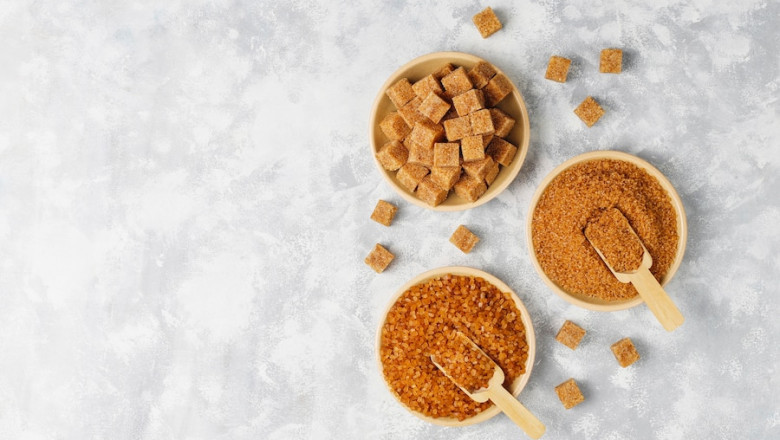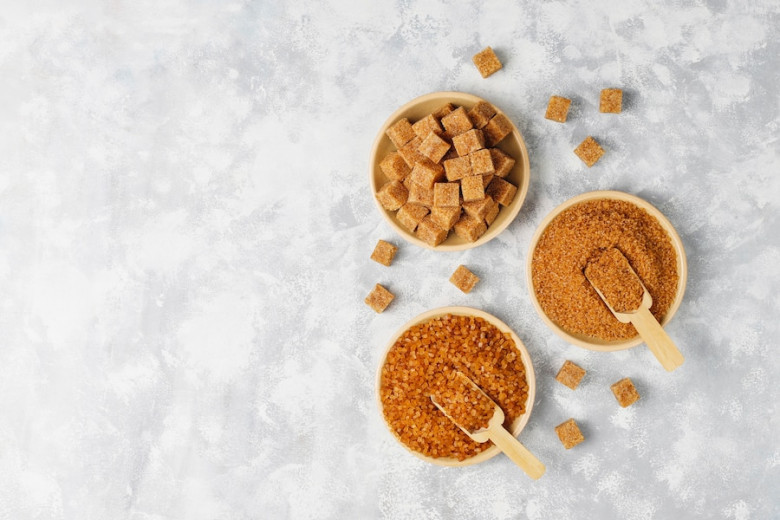views

Jaggery Vs Brown Sugar

Is there a sugar alternative that is better than superior white sugar and even better than less harmful brown sugar? Let us explore.
Without sweet meals, the Indian palette is always incomplete. This is because India consumes significant amounts of sugar and sweets. In the Indian market, there are many different types of sugars and their variations, including white sugar, brown sugar, jaggery, and honey.
These provide your food with a sweet flavour but differ in many ways, such as nutritious value and advantages. For instance, two of these sweeteners, brown sugar and jaggery, have very similar textures but differ from one another. Let us understand more!
What Is Brown Sugar?
Brown sugar is a type of sucrose sugar that is brown. Natural brown sugar is either an unrefined or partially refined soft sugar consisting of crystals of sugar with residual molasses or is created by combining molasses and white sugar.
Brown sugar's distinctive flavour, taste, and texture are due to the presence of molasses. Brown sugar can be either soft or gritty, depending on the moisture it contains. This can be changed by using different processing techniques and adjusting the amount of molasses. The soft, light and dark shades of brown sugar, which are widely used in baking, are the ones that people are more likely to be familiar with.
What Is Jaggery?
In Southeast Asia and Africa, gud, or jaggery, is a popular sweetener. It contains a significant amount of molasses because it is a less-refined type of sugar. In other words, jaggery is traditional non-centrifugal cane sugar popular in Southeast Asia, Africa, and the Indian subcontinent.
Being a concentrated cane juice product where molasses and crystals are not separated, its colour ranges from golden brown to dark brown. It has up to 20% moisture, 20% inverted sugar, and 50% sucrose. The notion that jaggery is healthier than other forms of sugar is widespread. However, scientific advances in science and research on the benefits and risks of jaggery for overall health are still in process.
Brown Sugar Vs Jagger: The Nutritional Value
Compared to white sugar, jaggery is unquestionably healthier. Let us know how!
What Is The Nutritional Value Of Brown Sugar?
100 grams of brown sugar contain the following:
-
Calories - 377 kcal
-
Carbohydrate - 97g
-
Calcium - 85 mg
-
Iron - 1.91 mg
-
Magnesium - 29 mg
-
Phosphorus - 22 mg
-
Potassium - 133 mg
-
Sodium - 39 mg
What Is The Nutritional Value Of Jaggery?
100 grams of jaggery contains :
-
Calories - 383 kcal
-
Carbohydrate - 98 g
-
Calcium - 80 mg
-
Iron - 5.4 mg
-
Magnesium - 160 mg
-
Phosphorus - 40 mg
-
Potassium - 140 mg
-
Sodium - 30 mg
-
Selenium - 1.4 mcg
Brown Sugar Vs. Jaggery: The Differences
Jaggery is used in various savoury and sweet Indian meals and beverages in India and the areas close to it. On the other hand, brown sugar is a versatile sweetener that comes in loose crystals, making it ideal for baking.
1. Production Method
The primary difference between brown sugar and jaggery is in the production method. Brown sugar is created by combining refined sugar with a certain amount of molasses. Because it contains molasses, brown sugar has a toffee-like colour and flavour. This sugar is typically found in barbecue sauces, cookie dough, and decadent desserts.
Palm sap or sugarcane juice is used to make jaggery. The juice from the sugarcane is reduced to a thick, dark paste and then poured into moulds to harden. Jaggery has a darker colour and a wide range of flavours because it is unprocessed. It has a fruity, earthy, caramel-like flavour with a hint of smoke.
2. Nutritional Value
Jaggery has a notable amount of iron and other necessary minerals, even though the two have identical calorific values. Due to its mineral content, jaggery is healthier for people looking to reduce their intake of empty calories from white or brown sugar.
Because brown sugar contains molasses, it must also contain minerals like calcium, potassium, iron, and magnesium. However, these minerals do not provide any advantages due to their low concentrations.
Despite this, brown sugar is preferable to white sugar because white sugar is devoid of nutrients and poses a risk of carrying sulphur. This material is poisonous to people but is still used in the refining process.
3. Sweetness
Another distinction between brown sugar and jaggery is the level of sweetness. Although it has a reputation for being a healthy sweetener, jaggery is less sweet than brown sugar. In addition, jaggery tastes different from brown sugar because it has more minerals. As a result, when using jaggery in place of brown sugar, you should use more of it to achieve the same amount of sweetness.
Which Is More Healthy?
No matter which sugar you choose to ingest, it will be bad for your health because it is made up entirely of empty calories. However, because it is less sweet and richer in minerals, jaggery has evolved into a far better substitute. The flavour and nutritional benefits of brown sugar and jaggery are their main differences.
Brown sugar and jaggery both contain molasses, but brown sugar has a higher glycaemic index and less in the way of vitamins and minerals. Therefore, concerning white sugar, brown sugar and jaggery are unquestionably healthier options.
The Bottom Line
Many medical specialists and fitness enthusiasts believe jaggery is better than white sugar. Jaggery, on the other hand, must be divided into pieces because it is solid and cannot simply be put into meals.
The best part is that if you are currently on a weight loss programme or want to start one, you can consume jaggery in minimal amounts, but not white or brown sugar.
To enhance your knowledge, check the link.












